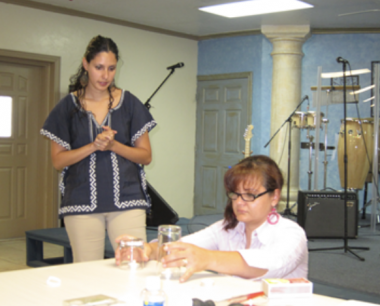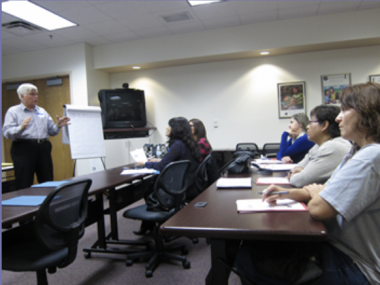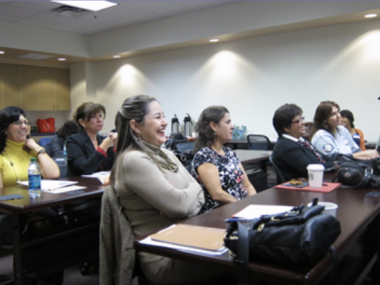How to Prepare for a Training
Module trainings require one or two trainers, depending on the intricacy of what is planned and the experience of the trainer. You have the flexibility to decide exactly how to structure and divide the training since the modules are a “skeleton” that it will be built on. It is important to reemphasize that the goal of these modules is flexibility therefore you can mix and match the components to fit the audience and expectations.
Before the Training
- Find out critical information about your audience to better plan the training. A good source would be the promotor coordinator or lead promotor. Some of this information may include previous knowledge, training expectation, and organizational needs.
- Determine the amount of time available for the training and how many promotores will participate.
- Select and confirm a training space according to the number of participants anticipated. Also, make sure you are aware if the trainings space will be occupied before or after in order to plan accordingly.
- Become familiar with the trainings space. Space familiarity can help you plan, for example, if you will need to bring additional tables/chairs, do you have enough space to conduct a hands-on activity, or do you need to bring a projector or computer.
- Review the module “background” information and other associated components. Become familiar with the options available for the training.
- Depending on the previous knowledge of the audience, you may want to research the “additional resources” in order to modify the education level of the training.
- Develop a training plan with the components you will uses from the modules.
- Contact the promotor coordinator or lead promotor to discuss your training plan to make sure that it encompasses not only individual needs but also organizational needs.
- Create a training agenda that follows the planned training that you have developed.
- If appropriate you may also want to design a training flyer that may be used internally or to invite additional promotores. It can also provide needed information such as directions to the training location and date/time of training.
- Write out a list of the training materials in addition to those associated with the hands-on activities/assessments (e.g. flip chart, easel, extra pens, name tags, audio-visual equipment, participation certificates, speakers, workshop packets, sign-in sheets etc.).
- Collect all of the hands-on activity supplies and training tools you will need. Make sure that you will have theses materials in enough time that you may practice the hands-on activities or assessments before hand.
- Customize the module presentation incorporating special requests, available time, or audience knowledge level.
- Put together packets that contain copies of the presentation, training agenda, extra paper, activity handouts, photo release forms, and other resources that you would like to provide.
Day of the Training
- Arrive early (45 minutes) before the start of the training in order to prepare hands-on activities, audiovisual equipment, sign-in sheets, training packets, and other materials you will need.
- Set-up the tables in a U-shape, if possible, so that everyone can talk to each other easily and also view the trainer or any hands-on activities with ease.
- Make sure to arrange hands-on activity materials so they are at hand when you need them.
- Write you name and contact information on the board or flip chart.
- Welcome them at the door (or have a greeter) and have them sign in as they arrive as well as provide them with the training packets.
- Once everyone is seated, introduce yourself to the group and tell them about your background. You may then go around the room to find out who they are by having them state their name, what is their work experience, what special resources do they have to share with their fellow leaners, what problems, questions or concerns do they hope to address, and why they are a promotor. You may also opt to implement one of the activities provided in the “ice breaker” section (page 12) if you would like to get more creative.
- Review the agenda with the training participants so they are familiar with what you have planned.
- Mention to them that they will be filling out training surveys at the end. Emphasize to them that this helps to better create and prepare future trainings.
- Begin the planned training after these house keeping and introductory steps have been taken.
After the Training
- Ask them to complete the training surveys and provide them to you once they are done.
- Thank participating promotores for attending and contributing to the training.
- Read the surveys that were provided by the training participants. If you are working with another trainer, debrief each other.
- Make note of any relevant feedback and incorporate them into future trainings.
- Contact training participants to provide any missing information or answers to questions that could not be answered during the training.
- Talk to the coordinator or lead promotor to get any additional feedback. You may also want to share any glaring comments or the overall sentiment of the training.
Remember to
- Stay within the time allotted! You may have a lot of material to cover or things may come up the day of the training. Be realistic with time management. It is common courtesy to respect people’s time and it is a golden rule of workshop professionalism.
- Be flexible! Promotores are very interested in the themes and may ask more questions than anticipated.
- Have fun! Promotores are energetic outreach professionals that enjoy personal interaction. If you are too formal, the training might be…too boring.




